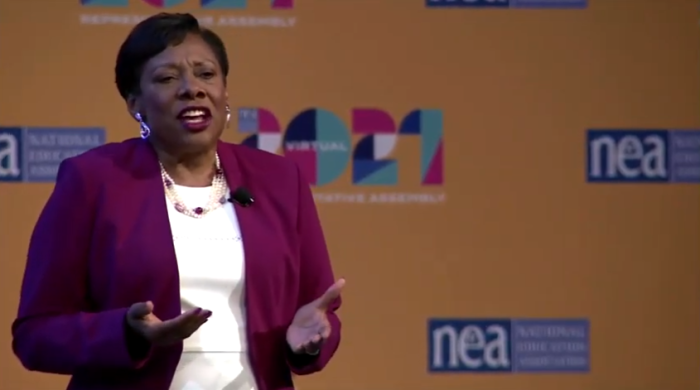National Education Association to spend over $100K to promote critical race theory

As several states around the country have taken preemptive steps to limit the teaching of the controversial critical race theory in schools, the National Education Association, the nation’s largest labor union representing more than 3 million members, is expected to spend more than $100,000 promoting it.
At the union’s annual meeting held virtually June 30-July 3, the NEA’s top decision-making body, the Representative Assembly, which consists of nearly 8,000 educator delegates representing state and local affiliates, adopted a motion to promote critical race theory in schools and set aside an additional $127,600 in its budget for that work.
According to details of the motion which were scrubbed from the union’s website Tuesday, the NEA, with guidance on implementation from President Becky Pringle and chairs of the union's Ethnic Minority Affairs Caucuses, will, “Share and publicize, through existing channels, information already available on critical race theory (CRT) — what it is and what it is not; have a team of staffers for members who want to learn more and fight back against anti-CRT rhetoric; and share information with other NEA members as well as their community members.”
They will also: “Provide an already-created, in-depth, study that critiques empire, white supremacy, anti-Blackness, anti-Indigeneity, racism, patriarchy, cisheteropatriarchy, capitalism, ableism, anthropocentrism, and other forms of power and oppression at the intersections of our society, and that we oppose attempts to ban critical race theory and/or The 1619 Project.”
The union will, among other things, also join with Black Lives Matter at School and the Zinn Education Project to call for a rally this year on Oct. 14 — George Floyd’s birthday. The rally will serve as “a national day of action to teach lessons about structural racism and oppression.”
Critical race theory is defined by some as a framework through which scholars seek to understand how victims of systemic racism are affected by cultural perceptions of race and how they are able to represent themselves to counter prejudice. Scholarship on the theory traces racism in the U.S. through the legacy of slavery, the civil rights movement and recent events.
Kimberlé Crenshaw, a founding critical race theorist and a law professor at UCLA and Columbia universities, explained the idea to CNN last year.
"It's an approach to grappling with a history of white supremacy that rejects the belief that what's in the past is in the past and that the laws and systems that grow from that past are detached from it," she said.
In her first remarks as president of the union last Wednesday, Pringle declared the union of educators to be proud racial and social justice activists.
"The NEA will lead a movement that unites not just our members, but the nation to reclaim public education as a common good,” Pringle told the delegates, “and transform it into something it was never designed to be — a racially and socially just and equitable system that prepares every student, every one, to succeed in a diverse and interdependent world."
She continued: “…if this society is to survive; if this grand experiment in democracy is to succeed; if the inhabitants of our nation are to prosper, we must continuously do the work to challenge ourselves and others to dismantle the racist interconnected systems, and the economic injustices that have perpetuated systemic inequities. We must bring into existence, systems that foster justice and fairness, and equality, and freedom.”
CRT has been a lightning rod for debate and controversial policymaking in recent years.
Last September, former President Donald Trump banned the idea from being taught at federal agencies after calling it “offensive and anti-American,” but President Joe Biden reversed the move shortly after taking office.
The theory has also split churches along racial lines in the Southern Baptist Convention — the nation’s largest Protestant denomination — prompting an exodus of some high-profile black congregations from the SBC in recent months.
Christopher F. Rufo, who said his research inspired Trump’s decision to abolish CRT training at federal agencies last year and vowed to fight against it, said he is ready to stand against the NEA’s campaign.
“The national teachers union is funding an attack machine against me, @Gundisalvus, and our allies. We were born for this fight—and will show no mercy to the corrupt ideologues who are ruining American education. Swords up!” he tweeted last Thursday.





























